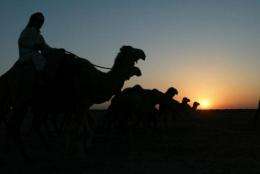Wind of change: Aussie 'farting camels' cull under attack

The world's association of camel scientists fought back angrily on Monday over Australian plans to kill wild dromedaries on the grounds that their flatulence adds to global warming.
The idea is "false and stupid... a scientific aberration", the International Society of Camelid Research and Development (ISOCARD) charged, saying camels were being made culprits for a man-made problem.
"We believe that the good-hearted people and innovating nation of Australia can come up with better and smarter solutions than eradicating camels in inhumane ways," it said.
The kill-a-camel suggestion is floated in a paper distributed by Australia's Department of Climate Change and Energy Efficiency, as part of consultations for reducing the country's carbon footprint.
The scheme is the brainchild of an Adelaide-based commercial company, Northwest Carbon, a land and animal management consultancy, which proposes whacking feral camels in exchange for carbon credits.
Camels were introduced to the Outback in the 19th century to help early settlers cope with hot, arid conditions.
Now they number around 1.2 million and, say some, are a pest because of the damage they inflict to vegetation and their intestinal gases.
Each camel, according to the champions of a cull, emits 45 kilos (99 pounds) of methane, the equivalent of one tonne a year in carbon dioxide (CO2), the main warming gas.
Northwest Carbon says it would shoot the camels from helicopters or corral them before sending them to an abattoir for eating by humans or pets.
But ISOCARD, an association of more than 300 researchers headquartered at al Ain University in the United Arab Emirates (UAE), said the calculations were absurd.
"The estimation of methane emission by camels is based on cattle data extrapolation," it said in a press release.
"The metabolic efficiency of camel is higher than that of cattle, (...) camels are able to produce 20-percent more milk by eating 20-percent less food, they have different digestive system and are more efficient in the utilization of poor quality roughages," it noted.
In addition, the bacterial flora of camel intestines means their digestion is closer to that of monogastric animals, such as pigs, rather than as cattle and sheep, said ISOCARD.
"Therefore, the estimation of camel methane emission is quite debatable, as well as the estimated feral population."
The 28 million camels in the world represent less than one percent of all vegetation-eating biomass, and their emissions are just a tiny fraction of those made by cattle, it argued.
"The feral dromedary camels should be seen as an incomparable resource in arid environments," the group said. "They can and should be exploited for food (meat and milk), skin and hides, tourism etcetera."
Australia is heavily reliant on coal-fired power and mining exports and has one of the highest per-capita carbon levels in the world.
The government plans to tax the nation's 1,000 biggest polluters for carbon emissions from mid-2012, with a fixed price giving way to a cap-and-trade scheme within five years.
To offset their emissions, polluters could buy carbon credits -- CO2 or other greenhouse gases that are avoided through other schemes.
(c) 2011 AFP





















